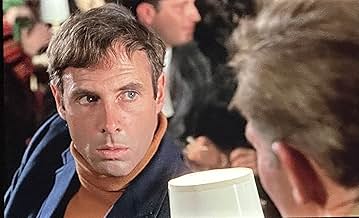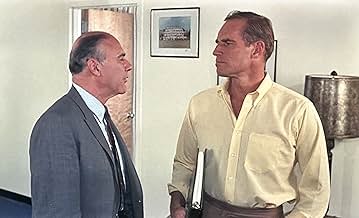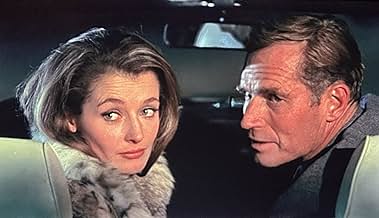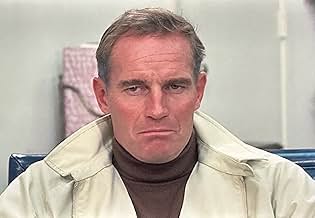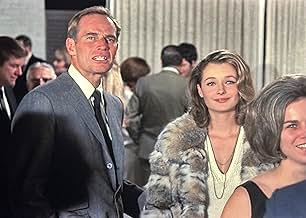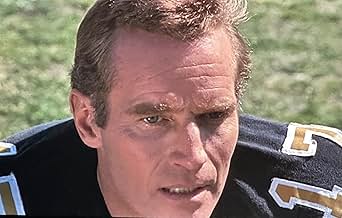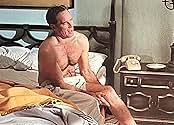The story of Cat Catlan (Heston), a washed up quarterback who turns to drink and women to solve his problems. But he soon discovers that his problems are just beginning.The story of Cat Catlan (Heston), a washed up quarterback who turns to drink and women to solve his problems. But he soon discovers that his problems are just beginning.The story of Cat Catlan (Heston), a washed up quarterback who turns to drink and women to solve his problems. But he soon discovers that his problems are just beginning.
- Director
- Writer
- All cast & crew
- Production, box office & more at IMDbPro
Featured reviews
Charlton Heston is the star quarterback for the New Orleans Saints..... and he's forty and thinking about retiring. The people around him are all younger than he, admiring and envious, management, who don't really care, and wife Jessica Harper, who has been listening to him talking about retiring for half a decade.
It's a well done rather melancholy portrait of a man who doesn't want to give up what makes him special. Bruce Dern, unlikable as always, gave up the game a decade earlier and now is the biggest car dealer in the state. He doesn't know why Heston won't quit and come make money with him. Only one, old, non-star player, now working in the oil fields, seems to have any idea of what Heston is going through.
Heston gives one of his mostly-stoic-then-cursing roles, and he's very good.
This movie didn't do well at the box office; they never distributed it overseas, figuring that no one cares about American football except Americans. I think A.E. Housman would have liked this movie.
It's a well done rather melancholy portrait of a man who doesn't want to give up what makes him special. Bruce Dern, unlikable as always, gave up the game a decade earlier and now is the biggest car dealer in the state. He doesn't know why Heston won't quit and come make money with him. Only one, old, non-star player, now working in the oil fields, seems to have any idea of what Heston is going through.
Heston gives one of his mostly-stoic-then-cursing roles, and he's very good.
This movie didn't do well at the box office; they never distributed it overseas, figuring that no one cares about American football except Americans. I think A.E. Housman would have liked this movie.
Charlton Heston's second of three films with director Tom Gries was this film set in the world of pro football. Heston plays a quarterback who's seen his best days, but just wants to hear the roar of the crowd. I can't think of another reason he could possibly have to stay.
Later on his career Heston played in a really great film about pro football, Any Given Sunday where he played the Commissioner of the game. Number One is seen from a different angle, that of the player who sees nothing out there for him when he's through hence he keeps going. Heston has not even heard too many cheers lately, in fact in a bad performance as the film opens he gets quite a few boos. Sports fans can be mighty fickle.
Football has a caste system more than any other team sports. The glamor guys are the backfield and the line are the grunts whose job it is to protect the glamorous ones who score the points. Two other portrayals of aging football players that of Roy Jenson and Bruce Dern. Jenson has one scene with Heston where he hits him up for a touch after a game and briefly and movingly describes his rather bitter life after the career was over.
Dern is different. As he puts it so eloquently he'd play a game on Sunday and he'd hurt through Tuesday. When he started hurting through Saturday it was time to quit. Smart man, as a running back and a glamor guy buy definition he's used his celebrity to build a nice profitable automobile leasing business and is looking to diversify. Next to Heston I liked him best in the film.
Dern typifies something that Stan Musial said about baseball. He knew when to quit when just getting into the uniform and playing a kid's game for lots of money ceased to be fun. Heston should have heeded his and Dern's advice.
A couple of women in Heston's life are wife Jessica Walter and football groupie Diana Muldaur. Walter has a very successful fashion designing business and hangs around with a crowd that Heston hates. It's the whole macho thing with Heston, but he also envies the fact they and the wife are making a success of something they love and are talented in.
Number One ranks up there with other great football films like the aforementioned Any Given Sunday. Heston paid great tribute to Tom Gries as a great director in his memoirs. His three films with Heston, Will Penny, Number One, and The Hawaiians give testimony to that.
Later on his career Heston played in a really great film about pro football, Any Given Sunday where he played the Commissioner of the game. Number One is seen from a different angle, that of the player who sees nothing out there for him when he's through hence he keeps going. Heston has not even heard too many cheers lately, in fact in a bad performance as the film opens he gets quite a few boos. Sports fans can be mighty fickle.
Football has a caste system more than any other team sports. The glamor guys are the backfield and the line are the grunts whose job it is to protect the glamorous ones who score the points. Two other portrayals of aging football players that of Roy Jenson and Bruce Dern. Jenson has one scene with Heston where he hits him up for a touch after a game and briefly and movingly describes his rather bitter life after the career was over.
Dern is different. As he puts it so eloquently he'd play a game on Sunday and he'd hurt through Tuesday. When he started hurting through Saturday it was time to quit. Smart man, as a running back and a glamor guy buy definition he's used his celebrity to build a nice profitable automobile leasing business and is looking to diversify. Next to Heston I liked him best in the film.
Dern typifies something that Stan Musial said about baseball. He knew when to quit when just getting into the uniform and playing a kid's game for lots of money ceased to be fun. Heston should have heeded his and Dern's advice.
A couple of women in Heston's life are wife Jessica Walter and football groupie Diana Muldaur. Walter has a very successful fashion designing business and hangs around with a crowd that Heston hates. It's the whole macho thing with Heston, but he also envies the fact they and the wife are making a success of something they love and are talented in.
Number One ranks up there with other great football films like the aforementioned Any Given Sunday. Heston paid great tribute to Tom Gries as a great director in his memoirs. His three films with Heston, Will Penny, Number One, and The Hawaiians give testimony to that.
If you can get past not seeing Charlton Heston in his usual stereotypical, larger than life epic roles you may enjoy seeing him take a turn at a modern drama as a normal human.
This movie is "very late 60's style" which is fun to watch now with it's flashback scenes and sixties lingo.
Great supporting cast and good chemistry all around. It's also neat seeing Heston in his sexier than usual love scenes.
Heston's performance is solid. You can feel his pain and bitterness. I highly recommend this film for Heston fans, sports fans and sixties film buffs.
This movie is "very late 60's style" which is fun to watch now with it's flashback scenes and sixties lingo.
Great supporting cast and good chemistry all around. It's also neat seeing Heston in his sexier than usual love scenes.
Heston's performance is solid. You can feel his pain and bitterness. I highly recommend this film for Heston fans, sports fans and sixties film buffs.
In the final scene when Catlan is crushed by the Dallas defense (actually portrayed by Saints players Mike Tilleman, Dave Rowe and Fred Whittingham), neither Heston nor the producer felt the hit on him was realistic enough, so Heston asked them to cut loose to make it look authentic. On the second take, the trio slammed the actor to the ground, breaking three of his ribs!!
As for a better actor to play this part or the "realism" as criticized below, Hogwash. I can't think of many actors back then or NOW that would take a hit like Heston did for any movie.
I enjoyed the show, LOVED the football scenes, liked the 60's look and feel of the show, and still love watching Charlton Heston movies. May he R.I.P.
As for a better actor to play this part or the "realism" as criticized below, Hogwash. I can't think of many actors back then or NOW that would take a hit like Heston did for any movie.
I enjoyed the show, LOVED the football scenes, liked the 60's look and feel of the show, and still love watching Charlton Heston movies. May he R.I.P.
The faded star-quarterback for the New Orleans Saints, over-the-hill at 40 and nursing a bad knee, considers retirement after an anonymous source disparages his season performances in print. Character rumination stacks the deck against our embittered hero: he's offered a management position with a computer firm and another job leasing cars (both offers are seen as dead-ends), while his unhappy wife is ready to walk out and a former teammate comes to him begging for a loan ($200!). Screenplay by David Moessinger is full of cynical one-liners substituting for insight into these unfulfilled people, while the football milieu is used mainly as a backdrop to the melodramatic action off the field. Charlton Heston is all wrong as an athlete--just because the man is tall and lean doesn't mean he's an ideal candidate for a football uniform. Heston is also unusually harsh with spouse Jessica Walter, who tired quickly of the Football Wives circle and now runs her own successful fashion business (Heston insults her creativity, equating it with an apparent inability to conceive a child; she slaps at him, he grabs her, and they end up making love). Director Tom Gries offers us only a flicker of insight into the world of professional football. He tries avoiding gridiron clichés, and his narrative timeline is interestingly woozy (mixing staccato flashbacks with bits of reality and, maybe, delusion), but the overall mood of the piece is unbelievably morose. Moessinger really does appear to believe that 40 means you're finished, washed-up. Heston may have felt there was something in the script he could play, something substantial and (atypical for the actor) not-heroic, but the picture isn't convincing. The foundation of the story--an aging man's fear that he's no longer useful after outgrowing his profession--is a good dramatic starting point for a character portrait (and still feels relatively fresh today), yet the writing is pretentious and dishonest. As to the downbeat finale, it underlines the pervading message that we're all "whores", like it or not. ** from ****
Did you know
- TriviaWhile not one of his more successful films from a box office standpoint, Charlton Heston recalled in his autobiography "In the Arena" that over the years a number of real life athletes who saw the film wrote to him praising his performance and the film, saying it perfectly captured exactly how it feels to be an athlete at the end of his prime and struggling to hold on.
- GoofsCatlan goes to the dressing room and is replaced by Williams. The announcer says that it is Saints ball, first and Ten on the Browns' 19. But the Saints go to the 15 where the ball has been placed, NOT the 19.
- How long is Number One?Powered by Alexa
Details
Box office
- Budget
- $1,100,000 (estimated)
Contribute to this page
Suggest an edit or add missing content

